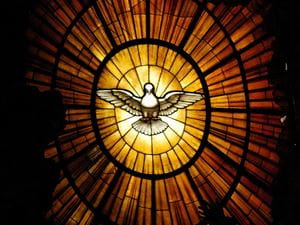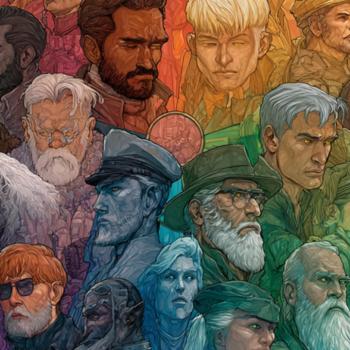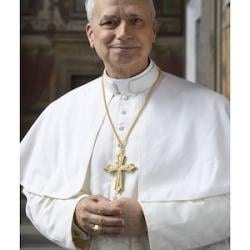
The Holy Spirit is, according to Christians, the eternal, active, personal presence of God. The great Christian creeds describe God as a Trinity—three Persons in One—Father, Son, and Holy Spirit. Christianity teaches that the Holy Spirit is not a powerful force or a generalized supernatural presence, but a personal being that shares essence with God the Father and with Jesus Christ. The Holy Spirit is called the Lord and Giver of Life, and is worshipped as God. (See the Nicene Creed.) The New Testament uses the names—Holy Spirit (1 Corinthians 12.3), Spirit of God (1 Corinthians 2.11), and the Spirit of Christ (Romans 8.9)—interchangeably.
Hebrew scriptures speak of the Spirit of God as the power of God extended into the world. The word “Spirit” in Hebrew is Ruah, which literally means breath or wind. The Spirit is seen from the first moments of creation when the Spirit of God hovered over the world (Genesis 1.2). The Spirit anointed the Israelite kings (e.g., 1 Samuel 16.13) and filled the Israelite prophets (e.g., Micah 3.8), directing and empowering God’s people to do the will of God and remain in relationship with God (Psalm 51.11). In Hebrew thought, the Spirit was linked to the visible glory of God leading the Israelites in the wilderness (Exodus 14.19-20), descending on Mt. Sinai during the giving of the Torah (Exodus 19.18), and indwelling the Temple (1 Kings 8.10-11). In judgment for the unfaithfulness of the people, God’s glory left the Temple during the Exile (Ezekiel 10), but in the prophet’s vision, the glory will one day return (Ezekiel 43.5).
The Gospels refer to the Holy Spirit in personal terms, as a Counselor or Helper who, like Jesus, was from God (John 14.16, 15.26). The Holy Spirit overshadowed Mary, conceiving in her the Son of God, Jesus (Luke 1.35). The Spirit filled Elizabeth, Mary’s cousin and the mother of John the Baptist (Luke 1.41) and empowered Zechariah, John’s father, to prophesy about his calling (Luke 1.67). The Spirit was then active throughout Jesus’ ministry, from his baptism (Matthew 3.16-17) to his power in healing (Luke 4.18). The Spirit gives new birth (John 3.8) and acted as a river of living water within the believer (John 7.38). In Jesus’ last conversations with his disciples before his crucifixion, he promised a permanent indwelling of the Spirit (John 14.16).
How Does The Holy Ghost Work?
The book of Acts, which is considered a second volume by the author of the Gospel of Luke, tells about the earliest days of the Church, and shows a strong emphasis on the activity of the Spirit in shaping the Christian community. Acts 2 tells the story of Pentecost when the Holy Spirit came down visibly as fire and audibly as a strong wind on all of the believers, empowering them to speak in different languages (Acts 2.4), to preach boldly (Acts 2.14-36), and to do many miracles (Acts 2.43).
The New Testament epistles also speak personally of the Holy Spirit within the life of those who believe. Paul wrote about the Holy Spirit as a source of life and peace, as a guide and helper, advocating for believers before God (Romans 8). He told the Corinthian church that the Spirit gives gifts to all believers that make it possible for them to teach, preach, heal, prophesy, speak in tongues, and more (1 Corinthians 12.7-11). The apostle Peter taught that the scriptures were all inspired by the Holy Spirit (2 Peter 1.21). The Spirit also appears in the last book of the Bible as One who, with the Church, calls for Jesus to return (Revelation 22.17).
You can learn more here about how Christians understand the Holy Spirit as one member of the Trinity.
12/8/2021 3:41:14 PM










